| Listing 1 - 10 of 15 | << page >> |
Sort by
|
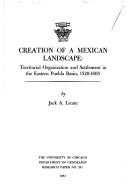
ISBN: 0890651078 Year: 1981 Publisher: Chicago (Ill.): University of Chicago. Department of Geography
Abstract | Keywords | Export | Availability | Bookmark
 Loading...
Loading...Choose an application
- Reference Manager
- EndNote
- RefWorks (Direct export to RefWorks)
Human geography --- -Mexico --- Puebla (Mexico : State) --- -Puebla (Mexico : State) --- -Civilization --- History
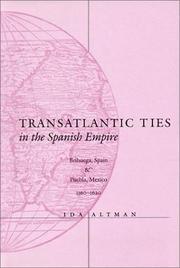
ISBN: 0804736634 Year: 2000 Publisher: Stanford, Calif. Stanford University Press
Abstract | Keywords | Export | Availability | Bookmark
 Loading...
Loading...Choose an application
- Reference Manager
- EndNote
- RefWorks (Direct export to RefWorks)
Spaniards --- -Spanish people --- Ethnology --- History --- -Brihuega (Spain) --- -Puebla (Mexico) --- -Emigration and immigration --- -History --- -Relations --- -Spaniards --- Spanish people --- Brihuega (Spain) --- Puebla de Zaragoza (Mexico) --- Puebla (Puebla, Mexico) --- Puebla (Mexico) --- Puebla de los Angeles (Mexico) --- Heróica Puebla de Zaragoza (Mexico) --- Emigration and immigration --- Relations --- Mexico --- 16th century --- Spain --- Spaniards - Mexico - Puebla - History - 16th century. --- Brihuega (Spain) - Emigration and immigration - History - 16th century. --- Puebla (Mexico) - Emigration and immigration - History - 16th century. --- Puebla (Mexico) - Relations - Spain - Brihuega. --- Brihuega (Spain) - Relations - Mexico - Puebla.
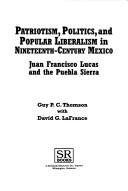
ISBN: 0842026835 Year: 1999 Publisher: Wilmington (Del.) : Scholarly Resources,
Abstract | Keywords | Export | Availability | Bookmark
 Loading...
Loading...Choose an application
- Reference Manager
- EndNote
- RefWorks (Direct export to RefWorks)
"Outstanding contribution to studies of popular liberalism. Constructs an in-depth portrait not only of Juan Francisco Lucas, but also of a coffee-growing region whose residents managed to maintain their way of life through their militant embrace of national liberalism"--Handbook of Latin American Studies, v. 58.
Nationalism --- Political leadership --- Violence --- History --- History --- History --- Lucas, Juan Francisco. --- Lucas, Juan Francisco --- Military leadership. --- Puebla (Mexico : State) --- Mexico --- Politics and government. --- History
Book
ISBN: 0190455764 0190651180 0190455756 0190455748 Year: 2017 Publisher: New York, NY : Oxford University Press,
Abstract | Keywords | Export | Availability | Bookmark
 Loading...
Loading...Choose an application
- Reference Manager
- EndNote
- RefWorks (Direct export to RefWorks)
William O. Jenkins (1878-1963) was a Tennessee farm boy who ventured to Mexico in search of fortune and became that country's wealthiest and most infamous industrialist. Dropping out of Vanderbilt, Jenkins eloped with a southern belle and settled in Mexico in 1901. Driven by a desire to prove himself - first to his wife's snobbish family, then to elites who disdained him as an American - Jenkins would spend the next six decades building an enormous fortune in textiles, property, sugar, banking, and film.
Businessmen --- Americans --- Philanthropists --- Altruists --- Humanitarians --- Benefactors --- Yankees --- Ethnology --- Business men --- Businesspeople --- Jenkins, William O. --- Jenkins, William Oscar, --- Jenkins, Guillermo, --- Jenkins, William, --- Puebla de Zaragoza (Mexico) --- Mexico --- Tennessee --- Economic conditions --- Puebla (Puebla, Mexico) --- Puebla (Mexico) --- Puebla de los Angeles (Mexico) --- Heróica Puebla de Zaragoza (Mexico)
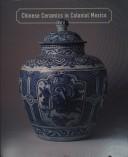
ISBN: 0875871798 Year: 1997 Publisher: Los Angeles, Calif. County Museum of Art
Abstract | Keywords | Export | Availability | Bookmark
 Loading...
Loading...Choose an application
- Reference Manager
- EndNote
- RefWorks (Direct export to RefWorks)
keramiek --- porselein --- ceramics [object genre] --- decorative arts --- porcelain [material] --- toegepaste kunsten --- Chinese ceramics styles --- Applied arts. Arts and crafts --- China --- Mexico --- Porcelain [Chinese ] --- Ming-Ch'ing dynasties, 1368-1912 --- Catalogs --- Enameled ware --- Puebla (Mexico) --- Chinese influences --- decorative arts [discipline]
Book
ISBN: 1469627752 1469627760 9781469627762 9781469627755 9781469627748 1469627744 9798890849373 Year: 2016 Publisher: Chapel Hill [North Carolina] [Place of publication not identified] University of North Carolina Press [publisher not identified]
Abstract | Keywords | Export | Availability | Bookmark
 Loading...
Loading...Choose an application
- Reference Manager
- EndNote
- RefWorks (Direct export to RefWorks)
In this political history of twentieth-century Mexico, Gladys McCormick argues that the key to understanding the immense power of the long-ruling Partido Revolucionario Institucional (PRI) is to be found in the countryside. Using newly available sources, including declassified secret police files and oral histories, McCormick looks at large-scale sugar cooperatives in Morelos and Puebla, two major agricultural regions that serve as microcosms of events across the nation. She argues that Mexico's rural peoples, despite shouldering much of the financial burden of modernization policies, formed the PRI regime's most fervent base of support. McCormick demonstrates how the PRI exploited this support, using key parts of the countryside to test and refine instruments of control--including the regulation of protest, manipulation of collective memories of rural communities, and selective application of violence against critics--that it later employed in other areas, both rural and urban. With three peasant leaders, brothers named Ruben, Porfirio, and Antonio Jaramillo, at the heart of her story, McCormick draws a capacious picture of peasant activism, disillusion, and compromise in state formation, revealing the basis for an enduring political culture dominated by the PRI. On a broader level, McCormick demonstrates the connections among modern state building in Latin America, the consolidation of new forms of authoritarian rule, and the deployment of violence on all sides.
State-sponsored terrorism --- Political corruption --- Government violence --- Governmental violence --- State-sponsored violence --- State terrorism --- Violence, Governmental --- Violence, State-sponsored --- Political atrocities --- Terrorism --- Jaramillo, Ruben M., --- Partido Revolucionario Institucional --- Partido de la Revolución Mexicana --- PRI --- P.R.I. --- History. --- Puebla (Mexico : State) --- Morelos (Mexico : State) --- Mexico --- Estado de Morelos (Mexico) --- Morelos, Mexico. --- Etat du Morelos (Mexico) --- Gobierno del Estado de Puebla (Mexico) --- Rural conditions. --- Politics and government
Book
ISBN: 9781108419819 110841981X 1108412181 9781108412186 9781108304245 1108329551 1108304249 1108330991 Year: 2018 Publisher: Cambridge Cambridge University Press
Abstract | Keywords | Export | Availability | Bookmark
 Loading...
Loading...Choose an application
- Reference Manager
- EndNote
- RefWorks (Direct export to RefWorks)
Using the city of Puebla de los Ángeles, the second-largest urban center in colonial Mexico (viceroyalty of New Spain), Pablo Miguel Sierra Silva investigates Spaniards' imposition of slavery on Africans, Asians, and their families. He analyzes the experiences of these slaves in four distinct urban settings: the marketplace, the convent, the textile mill, and the elite residence. In so doing, Urban Slavery in Colonial Mexico advances a new understanding of how, when, and why transatlantic and transpacific merchant networks converged in Central Mexico during the seventeenth century. As a social and cultural history, it also addresses how enslaved people formed social networks to contest their bondage. Sierra Silva challenges readers to understand the everyday nature of urban slavery and engages the rich Spanish and indigenous history of the Puebla region while intertwining it with African diaspora studies.
Slavery --- Slaves --- Blacks --- Asians --- Orientals --- Ethnology --- Negroes --- Enslaved persons --- Persons --- Abolition of slavery --- Antislavery --- Enslavement --- Mui tsai --- Ownership of slaves --- Servitude --- Slave keeping --- Slave system --- Slaveholding --- Thralldom --- Crimes against humanity --- Serfdom --- Slaveholders --- History --- Social networks&delete& --- Puebla de Zaragoza (Mexico) --- Mexico --- Puebla (Puebla, Mexico) --- Puebla (Mexico) --- Puebla de los Angeles (Mexico) --- Heróica Puebla de Zaragoza (Mexico) --- Foreign economic relations. --- Black persons --- Social networks --- 1600-1699
Book
ISBN: 9066240504 Year: 1982 Publisher: Leiden ICA
Abstract | Keywords | Export | Availability | Bookmark
 Loading...
Loading...Choose an application
- Reference Manager
- EndNote
- RefWorks (Direct export to RefWorks)
#SBIB:39A1 --- #SBIB:39A9 --- Rural health --- -Rural health services --- -Traditional medicine --- -Ethnic medicine --- Ethnomedicine --- Folk medicine --- Home cures --- Home medicine --- Home remedies --- Indigenous medicine --- Medical folklore --- Medicine, Primitive --- Primitive medicine --- Surgery, Primitive --- Alternative medicine --- Folklore --- Medical anthropology --- Ethnopharmacology --- Medical services, Rural --- Rural medical services --- Community health services --- Medical care --- Medicine, Rural --- Regional medical programs --- Hygiene, Rural --- Rural public health --- Environmental health --- Health --- Public health --- Antropologie: algemeen --- Medische antropologie / gezondheid / handicaps --- Puebla (Mexico : State) --- -Social conditions --- Rural health services --- Traditional medicine --- -Social conditions. --- -Antropologie: algemeen --- Ethnic medicine --- Gobierno del Estado de Puebla (Mexico) --- Social conditions.
Book
ISBN: 0870819860 9780870819865 9780870819322 0870819321 Year: 2009 Publisher: Boulder, Colo. University Press of Colorado
Abstract | Keywords | Export | Availability | Bookmark
 Loading...
Loading...Choose an application
- Reference Manager
- EndNote
- RefWorks (Direct export to RefWorks)
Syncretism (Religion) --- Christianity and other religions --- Christianity and culture --- Totonac Indians --- Nahuas --- Eclecticism (Religion) --- Religious syncretism --- Unionism (Religion) --- Religion --- Religions --- Christianity --- Syncretism (Christianity) --- Contextualization (Christian theology) --- Culture and Christianity --- Inculturation (Christian theology) --- Indigenization (Christian theology) --- Culture --- Naolingo Indians --- Natimolo Indians --- Tonaca Indians --- Totolaca Indians --- Totonaca Indians --- Totonacan Indians --- Totonaco Indians --- Totonacos --- Totonicapan Indians --- Totonoco Indians --- Indians of Mexico --- Mexicano Indians --- Naguatl Indians --- Nahoa Indians --- Nahua Indians --- Nahuate Indians --- Nahuatl Indians --- Nahuatleca Indians --- Uto-Aztecan Indians --- Rites and ceremonies. --- Missions --- Religion. --- Relations --- History --- Puebla (Mexico : State) --- Gobierno del Estado de Puebla (Mexico) --- Social life and customs. --- Religious life and customs.
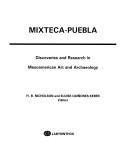
ISBN: 091143738X Year: 1994 Publisher: Culver City, Calif. : Labyrinthos,
Abstract | Keywords | Export | Availability | Bookmark
 Loading...
Loading...Choose an application
- Reference Manager
- EndNote
- RefWorks (Direct export to RefWorks)
"Collection of papers from a 1991 symposium focuses on Mixteca-Puebla concept and associated stylistic/iconographic tradition of the postclassic period. Includes papers on history of the concept and discussions of particular regions/subregions: Tlaxcala, Puebla, Cholula, Mixteca, Oaxaca, central Mexico, Tehuacán, and Nicoya. Illustrations include color plates"--Handbook of Latin American Studies, v. 57.
Mixtec art --- Mixtec pottery --- Aztec art --- Aztec pottery --- Art mixtèque --- Céramique mixtèque --- Art aztèque --- Céramique aztèque --- Congresses. --- Congrès --- Oaxaca (Mexico : State) --- Puebla (Mexico : State) --- Oaxaca (Mexique : État) --- Puebla (Mexique : État) --- Antiquities --- Antiquités
| Listing 1 - 10 of 15 | << page >> |
Sort by
|

 Search
Search Feedback
Feedback About UniCat
About UniCat  Help
Help News
News